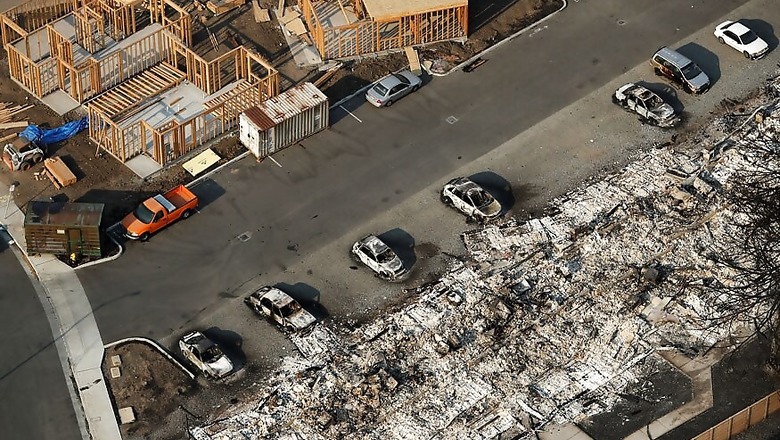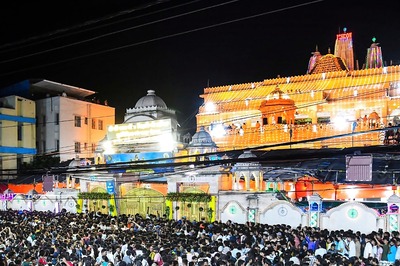
views
Sonoma: Firefighters gained ground on Thursday against wildfires that have killed at least 31 people in Northern California and left hundreds missing in the chaos of mass evacuations in the heart of the state's wine country.
The death toll, revised upward by eight on Thursday, marked the greatest loss of life from a single California wildfire event in recorded state history, two more than the 29 people killed by the Griffith Park fire of 1933 in Los Angeles.
With 3,500 homes and businesses incinerated, the so-called North Bay fires also rank among the most destructive.
The flames have scorched more than 190,000 acres (77,000 hectares), an area nearly the size of New York City, reducing whole neighborhoods in the city of Santa Rosa to ash and smoldering ruins dotted with charred trees and burned-out cars.
The official cause of the disaster was under investigation, but officials said power lines toppled by gale-force winds on Sunday night may have sparked the conflagration.
A resurgence of extreme wind conditions that had been forecast for Wednesday night and early Thursday failed to materialize, giving fire crews a chance to start carving containment lines.
But fierce winds were expected to return as early as Friday night, and a force of 8,000 firefighters was racing to reinforce and extend buffer lines across Northern California before then.
Despite progress, fire crews remained "a long way from being out of the woods," Ken Pimlott, director of the California Department of Forestry and Fire Protection (Cal Fire), told reporters in Sacramento, the state capital.
Mark Ghilarducci, state director of emergency services, added: "We are not even close to being out of this emergency."
DEATH TOLL COULD RISE
Authorities have warned that the death toll from the spate of more than 20 fires raging across eight counties for a fourth day could climb higher, with more than 400 people in Sonoma County alone still listed as missing.
One of the greatest immediate threats was to the Napa Valley town of Calistoga, whose 5,000-plus residents were ordered from their homes on Wednesday night as winds picked up and fire crept closer.
Calistoga Mayor Chris Canning said anyone refusing to heed the mandatory evacuation would be left to fend for themselves if fire approached, warning on Thursday: "You are on your own."
Melissa Rodriguez, her husband, baby and dog camped in the parking lot of a local college after smoke forced them to flee their Calistoga apartment.
"We have high hopes it will still be there when we go back. ... It feels sad, helpless, there's nothing we can do."
The Tubbs fire on Thursday was within 2 miles (3 km) of Calistoga, which was spared on the first night of the fires.
Whether the town burns "is going to depend on the wind," Calistoga Fire Chief Steve Campbell told Reuters. "High winds are predicted, but we have not received them yet."
Fire officials have said some people killed in the fires were asleep when flames engulfed their homes. Others had only minutes to escape as winds of over 60 mph (97 kph) fanned fast-moving blazes. Ghilarducci said the loss of cell towers likely contributed to difficulties in warning residents.
"We have found bodies that were completely intact, and we have found bodies that were no more than ash and bone," Sonoma County Sheriff Rob Giordano told reporters. He added that recovery teams would begin searching ruins with cadaver dogs.
NEARLY 500 MISSING
As many as 900 missing-person reports had been filed in Sonoma County, although 437 had since turned up safe, Giordano said.
It remained unclear how many of the 463 still listed as unaccounted for were actual fire victims rather than evacuees who failed to alert authorities after fleeing their homes, he said.
"The best we can pray for is that they haven't checked in," emergency operations spokeswoman Jennifer Larocque told Reuters.
Sonoma County accounted for 17 of the North Bay fatalities, all from the Tubbs fire, which now ranks as the deadliest single California wildfire since 2003.
About 25,000 people remained displaced on Wednesday as the fires belched smoke that drifted over the San Francisco Bay area, about 50 miles (80 km) to the south, where visibility was shrouded in haze and automobiles were coated with ash.
The fires struck the heart of the state's world-renowned wine-producing region, wreaking havoc on its tourist industry, while damaging or demolishing at least 13 Napa Valley wineries.
The full economic impact of the fires on the wine industry was not immediately clear. But 90 percent of grapes in Napa Valley were picked before the fires broke out on Sunday, according to Napa Valley Vintners.
California's newly legalized marijuana industry also was hit hard, with at least 20 pot farms in Sonoma, Mendocino and Napa counties ravaged, said Hezekiah Allen, executive director of the California Growers Association.
All the farms were seeking permits to eventually serve California’s nascent market for state-sanctioned recreational marijuana, Allen said.




















Comments
0 comment